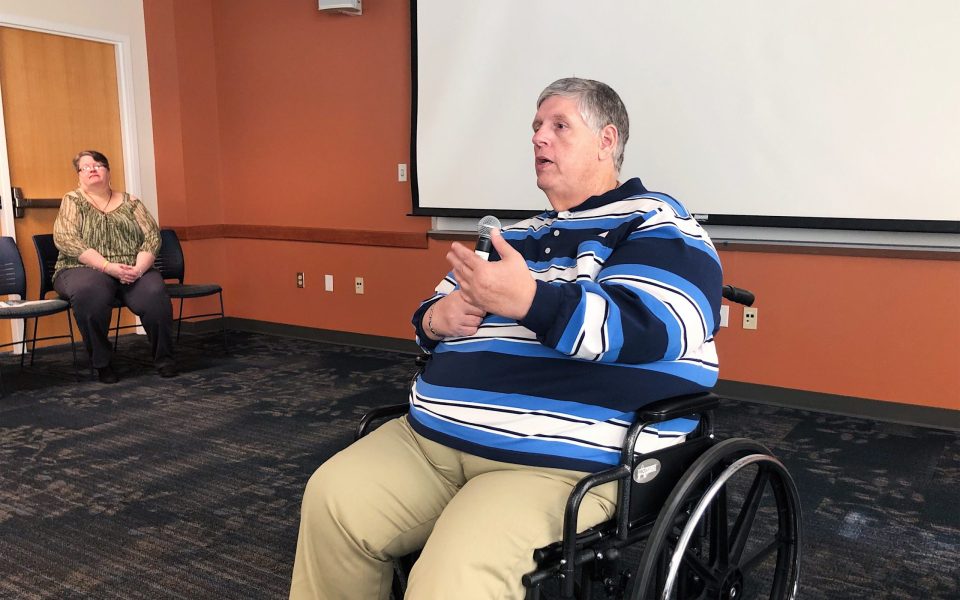The Greensboro Transit Authority helped prove a point on Feb. 1, when difficulties with the city’s bus system prevented Ananda Bennett from arriving on time for UNCG’s Center for Housing and Community Studies’ monthly “housing hangout” which would focus on the concerns of the Triad’s disabled community. Bennett, who is quadriplegic, spoke to a packed room about her ideas for the future of independent living for “quads” like herself.
The center facilitates multidisciplinary, community-based research on housing and assists housing advocates and policy makers with evaluation and technical planning. Greensboro’s gap between availability of affordable housing and incomes is highest in the state and seventh highest in the country, said Stephen Sills, the center’s director.
“Affordability is underlying a lot of the issues that we have,” Sills said. “If you are on a disability or receiving Medicare/Medicaid as your source of income, you are very limited in the selection of housing; most of that is aging, ill-kept if it’s private market. Accessibility is the other element there — building to universal needs. We can design, develop and provide affordable housing that is universally accessible; we just don’t do it well.”
North Carolina faces a deadline from the US Justice Department to move 3,000 qualified people from adult-care homes into independent housing by July 1, 2021, as laid out in a court settlement stemming from Disability Rights NC’s 2010 lawsuit that claimed the state was violating the Americans with Disabilities Act. The Olmstead settlement, as it is known, requires the state to provide people with disabilities the opportunity to live their lives on their own terms.
“The state got sued because they institutionalized many people with mental health diagnoses against their will when they were capable of living in the community independently,” said Debbie Hennessy, an independent living specialist at the Adaptables Center for Independent Living in Winston-Salem. “Of course, North Carolina and many other states, lost… [and] those people, deservedly so, are at the top of the list [for integration into community housing].”
Phillip Sheldon, a graduate research assistant at the UNCG center, said prioritizing disabled peoples’ agency is key to progress.
“The housing stock now has to allow for agency for the people who are living in it, so they can choose, ‘Hey, I want to live in this more supportive environment or I feel pretty independent, I can do everything I need to do in a day,’” Sheldon said. “A housing stock that allows you to make choices about what you feel comfortable with is what we need, and right now we don’t have it at all.”
Hennessy said people on their waiting list from 2016 might be waiting five to seven years for housing, and that many voucher programs are unable to place low-income, disabled people in a timely manner. Section 8, a voucher program through US Department of Housing and Urban Development, has beenclosed in Forsyth and Guilford counties until more space is available on the waiting list. According to Hennessy, this is a common practice state-wide and that she’s seen the waitlist open for as little as two days before filling again.
“It’s because there are so many folks on the waiting list that they can’t place that they do not want such a backlog because it can be years and years and years,” said Keith Greenarch, acting director of the Adaptables. “If folks are on a voucher then they might hold onto that and not look further for housing, and we find that quite a bit.”
“Public housing in general, whether voucher programs or full housing programs, do not have the bandwidth for the amount of people who actually qualify,” Sills said.
According to Hennessy, about 80,000 people are on the list for housing in North Carolina.
“We placed a gentleman just last week who’s been on the waiting list since November of 2016,” Greenarch said. “He has a spinal cord injury, he is in a chair, he’s also low-vision, he’s been on dialysis, and he’s been on the street. And he’d much rather be on the street than living in a nursing facility. I have people all the time tell me, ‘I’d rather live in my car than live in an institution,’ and that’s what centers for independent living are all about; we are about keeping people out of institutions, living in their own homes in their own communities… You eat what you want to eat, when you want to, you go shopping, you go to church. You make your own decisions on what you want to do.”
Join the First Amendment Society, a membership that goes directly to funding TCB‘s newsroom.
We believe that reporting can save the world.
The TCB First Amendment Society recognizes the vital role of a free, unfettered press with a bundling of local experiences designed to build community, and unique engagements with our newsroom that will help you understand, and shape, local journalism’s critical role in uplifting the people in our cities.
All revenue goes directly into the newsroom as reporters’ salaries and freelance commissions.


Leave a Reply